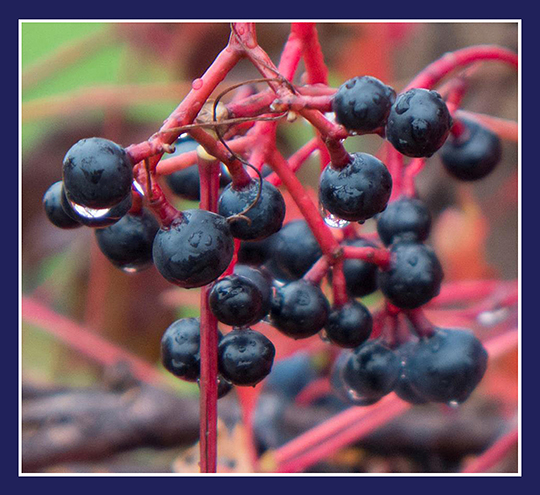
Is everything beautiful? Thoughts on justice and forgivenessCOFFEE WITH WARREN, with Warren Harbeck |

|
It would not be beautiful to pass these toxic Virginia creeper berries off as saskatoons: a lesson about justice and forgiveness. Photo by James Harbeck Last week’s column on seeing beauty amidst life’s blah raises a question about the pop song from the 1970s: Is everything “beautiful in its own way”? What about evil and injustice? Can’t we just pretend the blah is beautiful and get on with life? This question has really been bugging me the past few days after hearing a woman on the radio say about a sexual assault victim: “I’ve forgiven the man, so why can’t the victim just forgive and forget, too?” I bounced this off our Toronto writer/photographer son, James. He responded with a photo he’d taken of Virginia creeper berries. Now, these beautiful berries could easily be confused with saskatoon berries – similar size, shape and colour. One problem: saskatoon berries are totally tasty, especially in pies; Virginia creeper berries are totally toxic to humans. Suppose, then, someone intentionally sells you toxic Virginia creeper berries as tasty saskatoons. You serve them to your guests. Several become very sick; one even dies. You tell me about this nightmarish experience. Wouldn’t it be so simple for me to say, “I forgive the offender, so just get on with your life”? Preposterous! First, only those persons directly or indirectly affected can extend forgiveness. “Third parties do not have the power to forgive or excuse wrongdoings that they were not the victims of,” our Calgary coffee companion and interfaith colleague, Rabbi Shaul Osadchey, explained to me the other day. “Jews around the world recently concluded one of the most holy days of the year, Yom Kippur known as the Day of Atonement. It is a day during which Jews fast, reflect on their actions during the past year and seek forgiveness for wrongdoings. Those sins between individuals can only be atoned for when the wrongdoer confesses the misdeed, pledges not to repeat it, and then reconciles with the person that was harmed.” But what if the offender refuses to own up to a wrongdoing? Specifically about non-criminal offenses, Rabbi Shaul added: “Where there is an absence of reconciliation, justice must be enacted as a means of restoring the dignity of the person harmed and sending a clear message to the wrongdoer that there are consequences to such misdeeds.” And if it’s a criminal matter? This is where our justice system must step in to carry out its mandate to protect society at large and to make a statement on the unacceptability of certain actions, retired Edmonton lawyer/Anglican priest Martin Hattersley explained to me some years ago. In 1988, Martin was faced with the murder of his daughter by a fellow on day parole. The murderer was arrested and asked Martin’s forgiveness, which Martin himself, not a third party to the crime, but one of those deeply affected by it, extended to the murderer. Martin’s forgiveness did not mean the culprit was free to get on with his life, however. Forgiveness does not preclude justice. Martin even sat with the murderer during the trial to support him. The trial was not a means by which Martin would take revenge on the murderer – that was dealt with in his attitude and action of forgiveness. According to Martin, the aim of justice is deterrence, rehabilitation and punishment, for the protection of society as a whole. Indeed, not “everything is beautiful in its own way,” not even otherwise beautiful but toxic Virginia creeper berries when they’re passed off as something edible. We guard against the evil of vengeance within our own hearts through forgiveness and letting go of bitterness. We restore the dignity of the victim and protect society as a whole from evil – no matter how beautiful it may seem on the surface – through justice.
© 2016 Warren Harbeck |